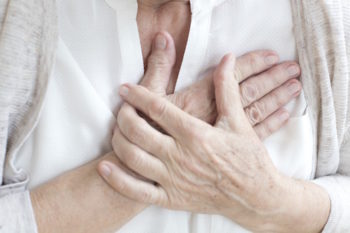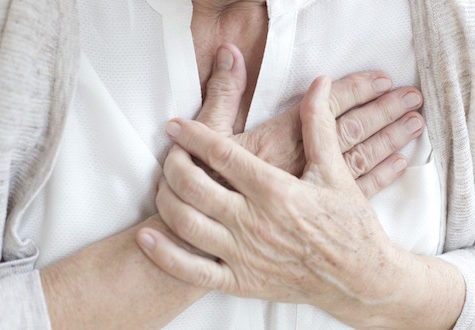
Any time you have pain in your chest, it can be unsettling. But the truth is, even though we assume the worst, the majority who experience chest pain aren’t having a heart attack. In fact, chest pain may or may not be coming from the heart, according to cardiologist Lawrence Gimple, MD.
What can cause chest pain?
It can come from your digestive system and even your lungs. Certain gastrointestinal conditions like acid reflux may cause chest discomfort, yet the problem actually originates in the stomach or esophagus. Lung problems like asthma or pneumonia can make the chest hurt. Even when chest pain does stem from the heart, it may be due to a benign or mild cardiac condition – not a heart attack.
The question is: How do you know when chest pain is a sign of something serious? According to Dr. Gimple, the only way to determine the exact source of your chest pain is to seek medical attention. However, there are some clues that can help you determine whether your worry is warranted and emergency treatment is necessary.
What are the signs of a heart attack?
According to Gimple, the term chest pain may be a misnomer when you’re talking about heart attack symptoms. “Most often, those experiencing a heart attack describe the sensation as tightening or discomfort as opposed to pain,” he says.
Other telltale signs of heart attack, especially among women include:
- Nausea or indigestion
- Shortness of breath
- Fatigue
If chest pain is severe (i.e. a true stabbing sensation), it may be due to another serious condition called an aortic dissection. This is defined as a tear in the inner wall of the aorta, the largest blood vessel in the body, which carries blood from the heart. Aortic dissection is rare but can be fatal, so a quick diagnosis is critical.
In addition to identifying the type of symptoms you’re experiencing, it’s important to also consider how long these symptoms last, says Gimple. “If the sensation lasts for more than a few minutes but subsides, you should make an appointment with your physician to follow up within a few days. If the feeling is consistent and prolonged for more than 10 minutes, you should promptly head to the emergency room for evaluation,” he says.
How do I know if I’m at risk for a heart attack?
Certain people are at greater risk for a heart attack and, thus, should be on heightened alert when it comes to chest pain or discomfort. Some of the most common risk factors include:
- A family history of premature coronary artery disease
- High blood pressure
- Diabetes
- High cholesterol
- Tobacco use
- Male gender and advanced age
Are You Having Chest Pain?
If you have one or more risk factors and experience chest pain, don’t hesitate to seek treatment at the UVA Emergency Department, which has a dedicated Chest Pain Center.
What can I expect if I seek treatment for chest pain?
“If you go to a center like UVA that has advanced imaging, cardiac evaluations are primarily non-invasive,” says Gimple. You’ll be evaluated quickly to determine the source of your chest pain, which may involve blood tests and an electrocardiogram, a simple test that records the heart’s electrical activity using sensors attached to the chest.
If necessary, more advanced, non-invasive imaging tests may be performed, including cardiac MRI, cardiac CT or echocardiogram. “With this kind of modern cardiac imaging, you can typically stop there – no more testing is needed to identify the source of the chest pain,” says Gimple.
Should you require a more in-depth evaluation, cardiac catheterization may be used to assess the coronary arteries and even to measure blood flow. This procedure typically involves inserting a catheter via a pinprick in the radial artery located in the wrist and advancing the catheter up to the heart for imaging .
Whether tests reveal you are experiencing a heart attack or something less severe, having access to a skilled team of doctors for chest pain evaluation helps ensure a positive outcome. “Should a serious abnormality be present, [we] can address it immediately,” says Gimple.
With certain types of heart attacks, time is of the essence – the quicker you’re treated, the more likely you are to survive. So don’t hesitate to seek treatment if you’re at an increased risk for heart attack and/or are experiencing symptoms.
